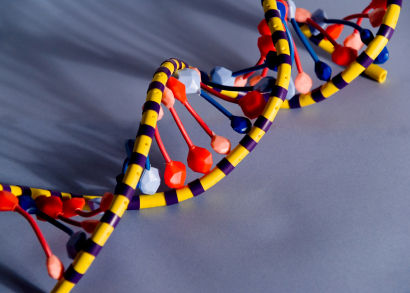We reach more than 65,000 registered users in Dec!! Register Now

DNA "markings" may transmit learned experiences
- April 14, 2014
- 966 Views
- 0 Likes
- 0 Comment
Learn≠ed ex≠pe≠ri≠ences can be trans≠ferred through ge≠net≠ic struc≠tures-not by changes to genes them≠selves, but rath≠er, to how they are "marked" by oth≠er mole≠cules, a study re≠ports. Such "mark≠ings" are called epige≠net≠ic changes. Sci≠en≠tists in re≠cent years have in≠creas≠ingly rec≠og≠nized them as play≠ing im≠por≠tant roles in bi≠o≠log≠i≠cal in≠her≠it≠ance. The find≠ing that learn≠ed ex≠pe≠ri≠ences ...
Learn≠ed ex¬≠pe¬≠ri¬≠ences can be trans¬≠ferred through ge¬≠net¬≠ic struc¬≠tures-not by changes to genes them¬≠selves, but rath¬≠er, to how they are ‚Äúmarked‚ÄĚ by oth¬≠er mole¬≠cules, a study re¬≠ports.
Such ‚Äúmark¬≠ings‚ÄĚ are called epige¬≠net¬≠ic changes. Sci¬≠en¬≠tists in re¬≠cent years have in¬≠creas¬≠ingly rec¬≠og¬≠nized them as play¬≠ing im¬≠por¬≠tant roles in bi¬≠o¬≠log¬≠i¬≠cal in¬≠her¬≠it¬≠ance.
The find­ing that learn­ed ex­pe­ri­ences may be trans­ferred this way is part of a re­cent wave of re­search over­turn­ing what bi­ol­o­gists used to as­sume-that only in­forma­t­ion in the DNA it­self is passed across genera­t­ions.
The stu­dy, pub­lished on­line Dec. 1 in the re­search jour­nal Na­ture Neu­ro­sci­ence, ar­gues that mice bi­o­log­ic­ally in­her­it in­forma­t­ion learn­ed by their grand­fa­thers.
Genes can be turned on or off semi-permanently with mo­lec­u­lar changes to the DNA, known as epige­net­ic marks. Some of these changes are main­tained across genera­t­ions, oth­ers aren't. Through, epige­net­ic changes, past stud­ies have linked trau­mat­ic or stress­ful ex­pe­ri­ences in an­i­mals to ef­fects on lat­er genera­t­ions' emo­tion­al behaviours.
![dna_cells-1600x1200[1]](http://machprinciple.com/wp-content/uploads/2014/04/dna_cells-1600x12001.jpg)
In the new work, Bri­an Di­as and Ker­ry Ressler of the Em­o­ry Uni­vers­ity School of Med­i­cine in At­lan­ta, Ga. found that spe­cif­ic learn­ed in­forma­t­ion can al­so be trans­mit­ted through epige­net­ic changes in sperm.
The re­search­ers trained mice to fear a cher­ry blos­som-like smell and then let these mice mate and con­ceive off­spring. These off­spring showed more fear­ful re­sponses to whiffs of cher­ry blos­som than to a neu­tral scent de­spite nev­er hav­ing en­coun­tered the smells be­fore, the sci­en­tists said.
More­o­ver, they added, the next genera­t­ion of off­spring showed the same behaviour. This fear re­sponse was passed to off­spring even if they were con­ceived with ar­ti­fi­cial in­semina­t­ion us­ing sperm, ac­cord­ing to the re­search­ers.
They al­so found that both in the trained mice and their off­spring, the fear re­sponse was as­so­ci­at­ed with changes to brain re­gions used to de­tect the feared scent, and with epige­net­ic marks in the sperm on the gene re­spon­si­ble for de­tecting the smell.
Source : http://www.world-science.net/exclusives/130114_fairness.htm








![dna-backgrounds-wallpapers[1]](http://machprinciple.com/wp-content/uploads/2014/04/dna-backgrounds-wallpapers1.jpg)
![Dna_wallpapers_12[1]](http://machprinciple.com/wp-content/uploads/2014/04/Dna_wallpapers_121.jpeg)
![0000-compile.jpgb7ce5414-b59f-42e2-aebe-dd2651604bb8Larger[1]](http://machprinciple.com/wp-content/uploads/2014/04/0000-compile.jpgb7ce5414-b59f-42e2-aebe-dd2651604bb8Larger1.jpg)

